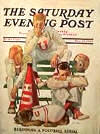|
P. G. Wodehouse
 October 15, 1881, witnessed the birth of English novelist
and humorist, Pelham Grenville Wodehouse. Born in Guildford, England,
Plum, as he came to be called, was one of the most popular writers of the
first half of the twentieth century. His father worked as a magistrate
in Hong Kong, and his mother traveled back and forth between England and
Hong Kong, leaving Wodehouse to be raised by a series of aunts. His
books are filled with evil and terrifying relatives, and he once wrote, "It
is no use telling me that there are bad aunts and good aunts. At the
core they are all alike. Sooner or later out pops the cloven hoof." October 15, 1881, witnessed the birth of English novelist
and humorist, Pelham Grenville Wodehouse. Born in Guildford, England,
Plum, as he came to be called, was one of the most popular writers of the
first half of the twentieth century. His father worked as a magistrate
in Hong Kong, and his mother traveled back and forth between England and
Hong Kong, leaving Wodehouse to be raised by a series of aunts. His
books are filled with evil and terrifying relatives, and he once wrote, "It
is no use telling me that there are bad aunts and good aunts. At the
core they are all alike. Sooner or later out pops the cloven hoof."
From as far back as he could remember, Wodehouse was
destined to become a writer. He published his first poem as a young
child, and he was constantly churning out stories. His first
contribution to a magazine for which he was paid was an article
called "Some Aspects of Game Captaincy," which he wrote while he was a
student. It won a prize of half a guinea and was published in The
Public School Magazine
in February 1900.
 "From my earliest years," he said, "I had always wanted to
be a writer. I started turning out the stuff at the age of five.
(What I was doing before that, I don't remember. Just loafing, I
suppose.)" While in high school, Wodehouse's father went bankrupt; so,
Wodehouse found a job as a bank clerk and started publishing humorous
stories and poetry on the side. He said, "[My] total inability to
grasp what was going on [at the bank] made me something of a legend." "From my earliest years," he said, "I had always wanted to
be a writer. I started turning out the stuff at the age of five.
(What I was doing before that, I don't remember. Just loafing, I
suppose.)" While in high school, Wodehouse's father went bankrupt; so,
Wodehouse found a job as a bank clerk and started publishing humorous
stories and poetry on the side. He said, "[My] total inability to
grasp what was going on [at the bank] made me something of a legend."
At 21, he started writing his "By the Way" column in the old
Globe. He also regularly contributed freelance stories to the
Captain magazine for boys. It's there that his famous
character, Psmith, made his first appearance.
In 1904, Wodehouse
traveled to America to cover a boxing match. He fell in love
with the former British colony and returned to the states in 1909. Within days of
his arrival, he learned that he had sold two stories to Untold Wealth;
so, he resigned from the Globe by telegram and stayed in New York for
several months.
 Wodehouse was fascinated by the
Big Apple, by the ways of the street
gangs, the political corruption in City Hall, and the extensive bribery in
the police force. He put his observations to work in two novels
representing political and social commentary:
Psmith, Journalist and A Gentleman of Leisure. He said
of New York, "Being there was like being in heaven without going to all the
bother and expense of dying." Wodehouse was fascinated by the
Big Apple, by the ways of the street
gangs, the political corruption in City Hall, and the extensive bribery in
the police force. He put his observations to work in two novels
representing political and social commentary:
Psmith, Journalist and A Gentleman of Leisure. He said
of New York, "Being there was like being in heaven without going to all the
bother and expense of dying."
On September 30, 1914, after returning to New York, Wodehouse married Ethel Newton, a
widow whom he had met there eight weeks earlier. She had a daughter, Leonora, whom Plum was to adore and eventually
adopt. The ceremony took place at The Little Church Around the Corner,
on East 29th Street, just off Madison Square.
 When the First World War broke out, Wodehouse tried to
enlist but was rejected for military call-up due to poor eyesight.
He spent most of the war in the United States and tried again to join the
army at
an allied forces recruitment centre. Again he was rejected, so he returned
to writing, this time turning out stories and articles for the prestigious
monthly journal, Vanity Fair, where he contributed as many as five pieces in
a single issue. He used different pseudonyms for different types of
writing, including J. Plum, Pelham Grenville, Melrose Granger, P.
Brooke-Haven, J. Walker Williams, C. P. West, and, on occasion, his real name. When the First World War broke out, Wodehouse tried to
enlist but was rejected for military call-up due to poor eyesight.
He spent most of the war in the United States and tried again to join the
army at
an allied forces recruitment centre. Again he was rejected, so he returned
to writing, this time turning out stories and articles for the prestigious
monthly journal, Vanity Fair, where he contributed as many as five pieces in
a single issue. He used different pseudonyms for different types of
writing, including J. Plum, Pelham Grenville, Melrose Granger, P.
Brooke-Haven, J. Walker Williams, C. P. West, and, on occasion, his real name.
 Wodehouse's novel, Something New (1915), published in
the U.K. as Something Fresh, represented the author's breakaway
success. It was serialized in the U.S. by the Saturday Evening Post,
the most prestigious weekly journal in the country. His next 27 novels
were all serialized in the U.S. (and most of them in the U.K., as well)
before book publication. Half of them appeared in the Post. His
pay for these serials gradually increased from $3,500 to $40,000 over a
25-year period. Wodehouse's novel, Something New (1915), published in
the U.K. as Something Fresh, represented the author's breakaway
success. It was serialized in the U.S. by the Saturday Evening Post,
the most prestigious weekly journal in the country. His next 27 novels
were all serialized in the U.S. (and most of them in the U.K., as well)
before book publication. Half of them appeared in the Post. His
pay for these serials gradually increased from $3,500 to $40,000 over a
25-year period.
Following his successful novel, Wodehouse once again turned
to writing about an elitist England populated by polite but
brain-dead aristocrats. The upper crust were constantly getting into
trouble and turning to the working class to help them out. His work
was wildly popular in the years leading up to the decline of the British
Empire. The first story in which his most beloved character, Jeeves,
appeared was Extricating Young Gussie. In it, Jeeves, a
servant who would go on to save his employer, Bertie Wooster, from
all sorts of domestic disasters and absurd situations, had but two lines,
and Bertie didn't yet have a surname.
 Published in the Saturday
Evening Post on the heels of Something New, Gussie was wildly popular
and was included in the short story collection The Man With Two Left Feet.
Wodehouse's book, My Man Jeeves, featuring eight stories (four about
Bertie and Jeeves), was published in 1919, and three further collections,
consisting exclusively of Bertie and Jeeves episodes, came out in 1923,
1925, and 1930. Published in the Saturday
Evening Post on the heels of Something New, Gussie was wildly popular
and was included in the short story collection The Man With Two Left Feet.
Wodehouse's book, My Man Jeeves, featuring eight stories (four about
Bertie and Jeeves), was published in 1919, and three further collections,
consisting exclusively of Bertie and Jeeves episodes, came out in 1923,
1925, and 1930.
In 1934, the first two novels, Thank You, Jeeves and
Right Ho, Jeeves, appeared. Another nine Jeeves and Wooster books would follow at regular
intervals. After that, Wodehouse wrote only two more short stories featuring the
popular duo.
An extremely shy man, Wodehouse once made his wife promise to rent them an
apartment on the first floor of a large building because he never knew what
to say to the elevator operator. People who knew him said that he was
incredibly dull, that he was never funny in person, and that he lacked all
personality. He said of himself, "I haven't got any violent feelings
about anything. I just love writing."
 Over the course of his lifetime, Wodehouse wrote close to a
hundred books of fiction, sixteen plays, and the lyrics for twenty-eight
musicals. When asked about his technique for writing, he said, "I just
sit at a typewriter and curse a bit." Best known for his metaphors and
similes, he once described a character as "A tubby little chap who looked as
if he had been poured into his clothes and had forgotten to say 'when!'"
He wrote of another, "He felt like a man who, chasing rainbows, has had one
of them suddenly turn and bite him in the leg." Over the course of his lifetime, Wodehouse wrote close to a
hundred books of fiction, sixteen plays, and the lyrics for twenty-eight
musicals. When asked about his technique for writing, he said, "I just
sit at a typewriter and curse a bit." Best known for his metaphors and
similes, he once described a character as "A tubby little chap who looked as
if he had been poured into his clothes and had forgotten to say 'when!'"
He wrote of another, "He felt like a man who, chasing rainbows, has had one
of them suddenly turn and bite him in the leg."
 In his lifetime, Wodehouse was regarded as a lightweight,
populist writer. More recently, his work has shown him to be a master
prose stylist. His most popular works were recently brought to
television in the form of the British series named simply Jeeves and
Wooster. It has since been released as a complete series on DVD
and videocassette tapes. In his lifetime, Wodehouse was regarded as a lightweight,
populist writer. More recently, his work has shown him to be a master
prose stylist. His most popular works were recently brought to
television in the form of the British series named simply Jeeves and
Wooster. It has since been released as a complete series on DVD
and videocassette tapes.
In 1975, Wodehouse was honored by being knighted by Queen
Elizabeth of Great Britain. P. G. Wodehouse, showing the signs of age
and a long and fruitful life, died shortly thereafter.

Discover P. G. Wodehouse
at Amazon.com
Indulge
Yourself - Check Out Today's Best-Selling
Fiction -
Nonfiction -
DVDs |








